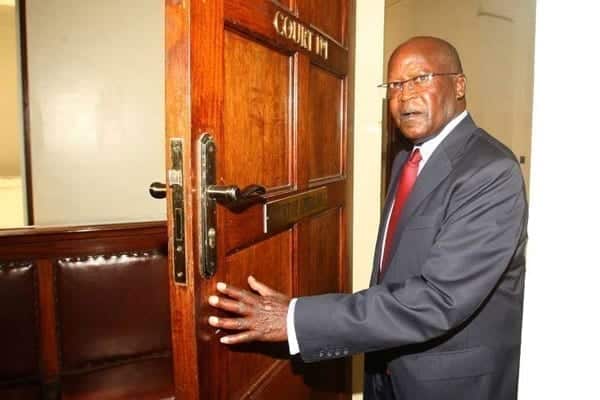
Embattled Supreme Court Judge Philip Tunoi has received a lifeline after President Kenyatta declined to suspend him and form a tribunal to investigate claims that he received a Sh200 million bribe.
In a letter to the Chief Justice and chairman of the Judicial Service Commission (JSC), Dr Willy Mutunga, dated February 19, President Kenyatta argued that suspending the Judge would occasion a constitutional crisis and advised that they await the outcome of an appeal he (Tunoi) had filed challenging a High Court decision to retire him after attaining seventy years of age.
President Kenyatta’s letter, sent to Dr Mutunga through Chief of Staff and Head of Public Service Joseph Kinyua states: “Our attention has been drawn to the decision of the high court in Petition No. 224 of 2014 where the court at Para 398 concluded that the petitioners (justices Philip Tunoi and David Onyancha), like other judges serving on the effective date, transited into the new constitution under section 31(2); and post-vetting, that they serve on the terms thereunder, including article 167(1) which states that a judge shall retire from office on attaining the age of seventy years.
RETIRED
“We further note that an appeal against the decision of the High Court has been instituted and is pending before the Court of Appeal and that the Court has yet to pronounce itself on the matter, consequently, the decision of the High Court stands,” it further states.
The letter states that the President is required to suspend the judge from office and thereafter appoint a tribunal.
“However, Justice Philip Tunoi has already been declared by a court of competent jurisdiction to have “retired from office on attaining the age of seventy years” and as the Court of Appeal is now seized of, and is due to make a determination on this same matter, it may rule either in favour of, or overturn the decision of the High Court,’ the President explains.
“At this particular moment in time when the Appeal is still pending and where the status of the Judge is subject to judicial consideration, implementing the recommendation of the Judicial Service Commission in line with Article 168(5) would create a constitutional crisis. We therefore propose that we await the outcome of the judicial process after which we will process the petition as required by the Constitution and the Law,” he concludes.
The JSC had early this month written to President Kenyatta recommending that he appoint a tribunal to investigate claims that the judge received a bribe from Nairobi Governor Evans Kidero to rule in his favour in an election petition.
SUPREME COURT
This is after a special committee formed by the JSC and chaired by Public Service Commission chairwoman Margaret Kobia ruled that there were sufficient grounds for the matter to be investigated further.
Mr Mutunga had noted that the commission was satisfied that there was “inappropriate interaction and communication” between Justice Tunoi and an agent of a litigant in a matter that was pending before the Supreme Court.
“This in the opinion of the commission amounts to gross misconduct and misbehaviour, sufficient to warrant the establishment of a tribunal to further investigate the matter,” the CJ stated.
Had the President formed the tribunal, Justice Tunoi would have remained suspended and on half salary for the entire duration of the investigation.
The outcome of the investigations could also have far-reaching implications on Dr Kidero’s political career, with the petitioner in the matter, Kabete MP Ferdinand Waititu, threatening to move to the Supreme Court to have the ruling that upheld the governor’s election set aside in light of the damaging allegations.







